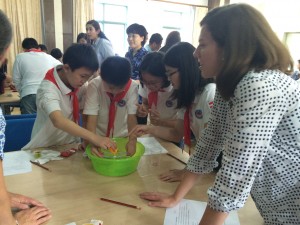On a sunny day in the medieval city of Siena, Italy, a classroom inside a beautiful 19th century building quietly bustles with students deep in the process of learning. Hands move about in concentrated but graceful fashion. UNCG School of Education Professions in Deafness professor Sam Parker is teaching his first language, American Sign Language (ASL), to Italian deaf students and deaf interpreters.
The class is part of an agreement between the UNCG and the Siena School for Liberal Arts. This was Parker’s first time teaching in Italy. During the three-week summer program, his charge was to teach ASL and to led a professional development workshop for Italian sign language interpreters from all over Italy.
Parker’s role didn’t end at instructor. He also became the student, taking a course in Italian Sign Language (LIS) and Italian deaf culture. The Sienna School uses the immersion model for both ASL and LIS; talking and use of the native sign language is not allowed.
“Through that immersive experience, students — including myself — were able to apply deeper levels of understanding, communication and language.”
According to Parker, the program is still in the exploratory phase; opportunities abound for additional learning partnership opportunities and learning outcomes.
Four of Parker’s students — now seniors in the School of Education’s interpreter preparation program — were part of the experience. They gained 60 hours of instruction, studying Italian Sign Language, Italian deaf culture and spoken Italian from early in the morning until dinnertime. Because it is immersive, the program was taught by deaf Italians and included interaction with members of the Italian deaf community.
The experience in Italy helped both Parker and his students feel well prepared to learn and use sign language in any country. “There is no such thing as a universal sign language,” he says. “As interpreters, our students will need to have a broad-based knowledge of the world to be able to effectively interpret one language into another. This experience broadens their scope and how they see and think about the world.”
Across all of its programs, the School of Education emphasizes practical experiences that give faculty the tools to enhance classroom instruction — and that help students gain confidence and skills by “doing.” The Experiencing China program is another great example.
Dr. Ye (Jane) He, in the Teacher Education and Higher Education program, and Dr. Kristine Lundgren in the School of Health and Human Sciences, led a group of 12 local teachers and education specialists to China this past summer to focus on curriculum development. The participants, who teach in 11 different North Carolina schools, learned about Chinese culture and language with the intent to integrate what they’ve learned into their classrooms. The Fulbright-Hays Group Projects Abroad Program sponsored the four-week program.
“One of the key features was that teachers came from different content and specialty areas,” He says. She and Lundgren recruited special education teachers, speech language pathologists and English as a Second Language (ESL) teachers. In addition, they made a point to have all levels of teachers, from elementary to high school. “This ensures that curriculum activities are designed for all learners.”
During the pre-departure course, the 12 teachers learned the Chinese language and were paired with a UNCG student from China. They also had language and culture seminars while in China. All teachers are currently working on integrating what they learned in their classroom instruction.
UNCG’s partners included Shanghai Normal University, Shanghai Xuhui Education Bureau and a variety of Chinese schools — including elementary, middle, high, special education and private schools. Dr. He and Lundgren plan to lead another group to China next May. To learn more about the program, read the blog post on UNCG Global Engagement Spotlight and the blog of one of the participating teachers.
Written by Andrea Spencer
